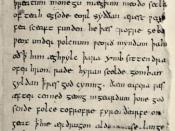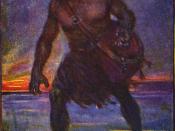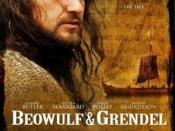The One Who Will Be King
Beowulf contains a myriad of different heroic ethical and social values. Most of these values are ingeniously rooted within, or made evident by the opposing forces of the poem. The initial opposing force arrives in the form of Grendel, a vile creature who's rampages mirror that of a modern serial killer. As the poem draws toward the conclusion, it focuses on the dragon, a creature developed by the poet to solidify the rise and fall of the archetypal hero.
After Adolf Hitler failed in his artistic studies at Vienna, he began to develop what would become a reign of terror on those who were not like him. His backlash towards a society that rejected him as an artist spawned his anti-Semitic and political beliefs. The same anti-societal anger has found its way into the minds of countless other killers, both past and present.
Take for example Theodore (Ted) Bundy, who in 1978, after watching students drink and dance in a college bar, witnessed 'a healthy ritual of joy from which we know he forever felt exiled'. Shortly thereafter, Bundy left the bar and traveled to the Chi Omega sorority house where he watched from outside, entered, and then killed two girls and wounded two others.
Just as Bundy had done, Grendel watched and surveyed from the distance. He waited outside the great hall, listening to the mirth and celebration from within. He hated them. The revelers inside felt no 'misery of men.' They were not uninvited, outcast, and below the social class of Hrothgar's company. These feelings of inadequacy propel Grendel to slaughter those who oppress him. For 'twelve winters' he smashes bodies and eats his victims, creating a bloody rampage and a dire need for a savior.
The question of Grendel's origin is difficult to trace. The author remains ambiguous throughout the poem, referring to Grendel as biblical, but also suggesting that he is human. The original manuscript often refers to Grendel as 'man', but man' with a long vowel meant evil, whereas 'man' with a short vowel literally meant a man. It cannot be certain which pronunciation the author intended, what has been butchered in the translation, or whether this was meant to be a crafty play on words. Grendel is indeed associated with Cain at the beginning of the story, but, 'if Grendel is a kinsman of Cain, he is also a kinsman of Adam,' and therefore both human and evil.
Whatever the origin of Grendel, the author nonetheless creates a beautiful example of a being so terrible that he must be eliminated at all costs. Grendel exists in a world where he is unfit, and therefore he must be destroyed. He arrives as a portrait for the horrible side of man, perhaps as a result of original sin, and perhaps from society. In his death, Beowulf serves as representative for both God and the majority. Beowulf serves God if Grendel is indeed biblical, for then Beowulf has destroyed evil. Likewise, if Grendel is human, then Beowulf has served mankind by eliminating a pestilent serial killer who is beneath (and outcast from) society.
However, eliminating the enemies isn't as important as the selfless courage needed to do so. Beowulf has to protect his country and comrades until his death. He must face whatever evil surfaces and step forward to defeat it. He is like a machine, fueled by his reverence. As men show cowardice, Beowulf grows stronger. A perfect example of this cowardice comes when Beowulf enters the dragon's lair. Here the other men 'crept to the wood, (and) protected their lives.' Even though they knew that the odds were against Beowulf (as did he), they let a seventy year old man battle a powerful beast rather than risk dying themselves. These men could not even protect their own king, for their cowardice and selfishness took precedence over Beowulf's life.
The dragon's existence is a result of its need to be placed there in order to kill the hero. Jung states correctly that as the hero 'enters the mature phase of life, the hero myth loses its relevance. The hero's symbolic death becomes... the achievement of that maturity.' This final achievement cannot occur without a death-bringing evil, and a majority afraid to act against that evil.
Even though Wiglaf steps forward to aid in defeating the dragon, he does so only to exhibit the courage needed to carry on the heroic tradition. His presence allows Beowulf to die peacefully, for Beowulf knows that Wiglaf will 'attend to the people's needs hereafter.' This passing down of tradition helps the poet to leave the doors open for future heroes, much like an open ending in a film allows the possibility of a sequel.
The Anglo-Saxons were not the only culture where the hero myth was prevalent. Throughout history, cultures that had no possible means of contact between each other share this archetype. The monsters in this poem help us to trace the roots of our ancestor's beliefs, and they also help us to develop a better understanding of courage, dedication, and heroism.


